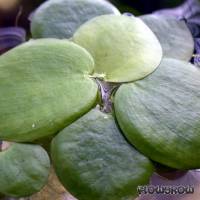



Limnobium laevigatum, Amazon frogbit, is a floating plant that looks a bit like a very large duckweed. It is native to lakes, ponds and slow-flowing rivers in all of Central and South America.
Compared with the North American frogbit species Limnobium spongia, which is only rarely cultivated in aquaria these days, it is much more adaptable especially regarding temperature. Common frogbit (Hydrocharis morsus-ranae), native to Europe and Western Asia, is hardy and thus a great pond plant. It hibernatives in the form of winter buds (turions), and, other than Limnobium laevigatum, it is possibly not apt to live in a tropical tank in the long run.
The growth habit of the Amazon frogbit is comparable to other floating plants. The floating rosette forms runners regularly, at whose ends young plants grow. In calm-water zones of the aquarium, carpets of these plants will form after a relatively short time, which may lead to uncalled-for shading of the ground.
Under strong light, with good fertilisation and high air humidity, emersed leaves may form above the waterline. CO2 injection furthers growth. This plant may even flower in the aquarium, although rarely.
Propagation happens automatically. Under optimal conditions you will have a large quantity of frogbit very soon in your tank.
Many people don't see how floating plants help an aquarium layout, as they create shaded areas and grow very long vertical roots. However, just these aspects can be integrated into a design. The play of shade and light can create interesting contrasts in a layout, and the elegant-looking roots may have a very decorative effect.
<a href="https://www.flowgrow.de/db/aquaticplants/limnobium-laevigatum" target="_blank"><img alt="Limnobium laevigatum" title="Limnobium laevigatum" src="https://www.flowgrow.de/db/widget/aquaticplants/limnobium-laevigatum" /></a>
[url=https://www.flowgrow.de/db/aquaticplants/limnobium-laevigatum][img]https://www.flowgrow.de/db/widget/aquaticplants/limnobium-laevigatum[/img][/url]
[widget=aquaticplants/limnobium-laevigatum]Limnobium laevigatum[/widget]